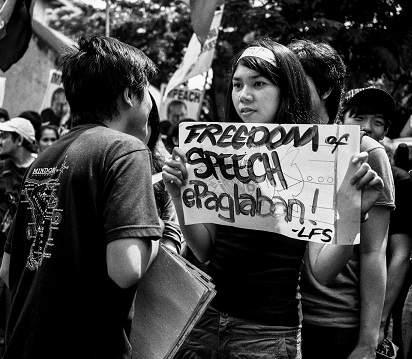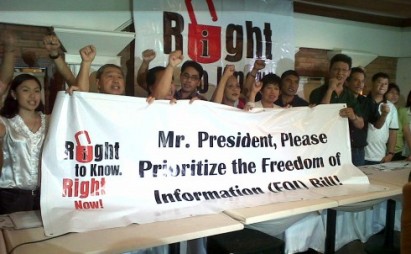LET’S HEAR it from Netizens.
In a joint statement on Friday, Netizens writing for various blog networks pledged their support and gigabytes to the growing multi-sectoral clamor for the immediate passage of the Freedom of Information (FOI) bill, before the 15th Congress packs up and goes.
Ten senior bloggers who signed the statement that was read at the press conference of the Right to Know, Right Now! Coalition called on the members of the House of Representatives to “pass the FOI bill NOW… without delay and distraction.”
The bloggers raised three arguments for the FOI’s immediate passage, notably:
* The bill “breathes life into the constitutional mandate of transparency and accountability… and compels the Government to fulfill a promise that has persistently been broken.”
* The bill “enables the people to be vigilant over the use of public funds,” and upholds “(our) right to guard our taxes — The People’s Money — against theft and wasteful spending.”
* The bill “assures faster, more reliable delivery of basic and essential information for its citizens — guaranteeing access to public documents that affect our lives — whether these affect private lives or properties, or whether these affect public policy.”
The FOI bill must pass, they said, without need for a right-of-reply (RoR) provision “that imposes a chilling effect on responsible citizens otherwise eager to speak truth or facts without the burden of harassment by politicians who wield awesome influence or resources.”
Citing libel laws, self-regulation policies in place in media agencies, and “the Terms of Service of individual social media providers,” the Netizens nixed the inclusion of an RoR clause in the FOI bill.
“The push now for Right of Reply is designed, in great part, to minimize the impact of FOI on the forthcoming elections, even though it is during electoral campaigns when discussion of public matters is most urgent and vital,” the Netizens said.
Here is the full text of the Netizens’ statement:
Statement On the Immediate Passage of the Freedom of Information (FOI) Act
18 January 2013WE, Netizens of the Philippines, call on the House of Representatives to pass the Freedom of Information (FOI) Bill NOW.
First, the FOI breathes life into the constitutional mandate of transparency and accountability of our Government. It compels the Government to fulfill a promise that has persistently been broken.
Second, the FOI Bill enables the people to be vigilant over the use of public funds with further guarantees of transparency and oversight. We have the right to guard our taxes — The People’s Money — against theft and wasteful spending.
Third, the FOI Bill assures faster, more reliable delivery of basic and essential information for its citizens — guaranteeing access to public documents that affect our lives — whether these affect private lives or properties, or whether these affect public policy.
The FOI Bill needs to pass without delay or distraction.
We, the Netizens, further call on the Congress to pass the FOI Bill without a right-of-reply (RoR) rider that is so inconsistent with the Constitution:
a) It imposes a chilling effect on responsible citizens otherwise eager to speak truth or facts without the burden of harassment by politicians who wield awesome influence or resources.
b) There already exist constitutional measures designed to counteract defamatory expression concerning public officials or matters, such as the laws and jurisprudence on libel, the Terms of Service of individual social media providers, or the policies of self-regulatory bodies of press organizations.
c) The push now for Right of Reply is designed, in great part, to minimize the impact of FOI on the forthcoming elections, even though it is during electoral campaigns when discussion of public matters is most urgent and vital.
As such we Netizens, call on the Members of Congress who have pledged to support and pass the FOI Bill to do so NOW.
We Netizens ask the public to join us in urging that the FOI Bill be passed now.
Signed by:
Noemi Lardizabal -Dado (@momblogger), Blog Watch
Cocoy Dayao, (@cocoy), Democracy.Net.PH
Francis Acero, (@francisacero), Democracy.Net.PH
Oliver Reyes (@ageofbrillig), Democracy.Net.Ph
Pierre Tito Galla, (@jesterinexile), Democracy.Net.PH
Cecille Soria,(@ceso), Democracy.Net.PH
Jane Uymatiao (@philippinebeat), Blog Watch
Juned Sonido (@juned),,Democracy.Net.PH , Baratillo Pamphlet
Angelo Louise Lopez (@GeloLopez) , Blog Watch
Oliver Robillo, @blogie, BlogPress.ph






